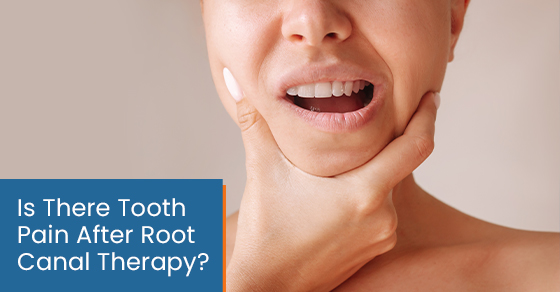Root canals are an intimidating procedure. Despite being perfectly safe, straightforward, and routine, many patients still experience nerves before their appointments. At Bloor West Smiles, we want you to feel comfortable and at ease when you visit our office and part of alleviating that anxiety is being as informed as possible.
Unfortunately, root canal therapy has a bad reputation. This procedure is commonly associated with pain, and lots of it. However, this perception is far from the truth.
Thanks to modern advances in dentistry and anesthetics, having a root canal performed feels the same as having a cavity filled. You may feel a slight discomfort, but it should not be painful. The procedure is relatively short, with most root canals completed in less than 60 minutes.
Yet, what about after the procedure? Will you feel any tooth pain, and if so, how much and for how long? This article answers those questions (and more).
Some Minor Pain is Normal After Your Root Canal Treatment
Feeling some minor pain after receiving your root canal treatment is normal. Most patients report feeling sensitivity, tenderness, and discomfort for the few days following their procedure.
When you get a root canal, your dentist applies a local anesthetic that numbs the area and minimizes pain. It takes multiple hours for the anesthetic to wear off, so you will experience numbness for some time after the completion of the surgery.
As the effects of the anesthetic fade, you might begin to experience some pain and sensitivity.
This minor pain, discomfort, and inflammation can last several days. It is normal and relatively common for several reasons.
Inflammation: After a root canal, the ligaments, tissue, and small nerves surrounding the tooth can become swollen or inflamed, causing discomfort and pain.
Additional Damage: Root canal therapy uses sharp dental instruments to clean the infection. Sometimes, this process inadvertently damages the sensitive surrounding tissue, which can take a little while to heal fully.
High Temporary Filling: Your dentist places a temporary filling after your root canal. This filling should be smooth and in line with the rest of your bite. In some cases, however, the filling is slightly higher than the surrounding teeth, which can cause soreness.
It’s essential to remember that it’s normal to feel some minor pain for a few days after your procedure. It is part of the healing process.
Your tooth will soon be completely free of pain and discomfort after the root canal site has recovered from treatment.
How to Avoid Additional Pain
Although some discomfort and sensitivity are expected, you can do things to worsen your pain. Following your root canal aftercare treatment plan is essential to minimize pain and avoid further complications.
In the days following your procedure, you must be extremely careful when eating. First, you should not attempt to eat or drink anything until the anesthetic wears off and you have regained feeling in your mouth.
Once the numbness is gone, try to chew as little as possible and only on the unaffected side of your mouth. Limit yourself to smoothies, yogurt, and soft cereal.
In the days following, continue to chew on the side of your mouth that did not have the root canal. Consume soft foods that are neither hot nor cold since your gums and teeth may be extra sensitive to extreme temperatures. Do not eat chewy, sticky, or hard foods. These can damage the treated tooth or pull out the temporary filling.
Additionally, it’s essential to maintain your oral hygiene to prevent infection as you heal. You should brush the area gently and increase your use of mouthwash. Do not floss around the treated tooth, as you can dislodge the temporary filling.
Managing Root Canal Pain At Home
Pain management is essential in the first few days following a root canal. Your Toronto dentist at Bloor West Smiles will prescribe you anti-inflammatory and pain relief medication. You may have been given an antibiotic if the infection spread beyond the tooth’s roots.
In most cases, over-the-counter and prescription pain relievers will be sufficient to relieve your pain after a root canal. Be sure to follow the instructions carefully and take your medication as directed.
Another way to reduce pain and swelling is to rinse with lukewarm salt water. Simply dissolve a teaspoon of salt in a cup of warm water and then rinse, swish, and spit. Do this up to three times a day.
Serious and Prolonged Pain After 1-2 Weeks is Not Normal
You should not feel severe, sharp, or intense pain 1-2 weeks after your root canal treatment. It is
not
normal. Prolonged pain indicates that your root canal has failed and the infection still exists in the tooth. You should contact Bloor West Smiles immediately.
Root canal treatments (sometimes) fail for any of the following reasons:
Your tooth had additional cracks or damage not detected by your dentist.
The root of the tooth was not cleaned properly.
There was a further hidden infection that was not discovered and treated.
In these cases, you will require a second root canal treatment. If the infection or damage is especially severe, the tooth may need to be extracted instead and replaced with a dental implant or bridge. Your dentist will always try to save your natural tooth whenever possible.
Fortunately, most root canals are successful.
Visit Bloor West Smiles for Your Root Canal in Toronto
If you need a root canal, there is nothing to fear. These procedures are straightforward and relatively pain-free.
Although some minor pain and sensitivity are normal in the days immediately following your root canal, you will soon be back to feeling like your regular self.
Dr. Kostirko at Bloor West Smiles has performed thousands of root canals throughout his over-25-year career. With his expertise and modern dental technology, you are in good hands.
To learn more about a root canal in Toronto, call Bloor West Smiles at 416-766-2853 or contact us here.

Sorry, comments are closed for this post.